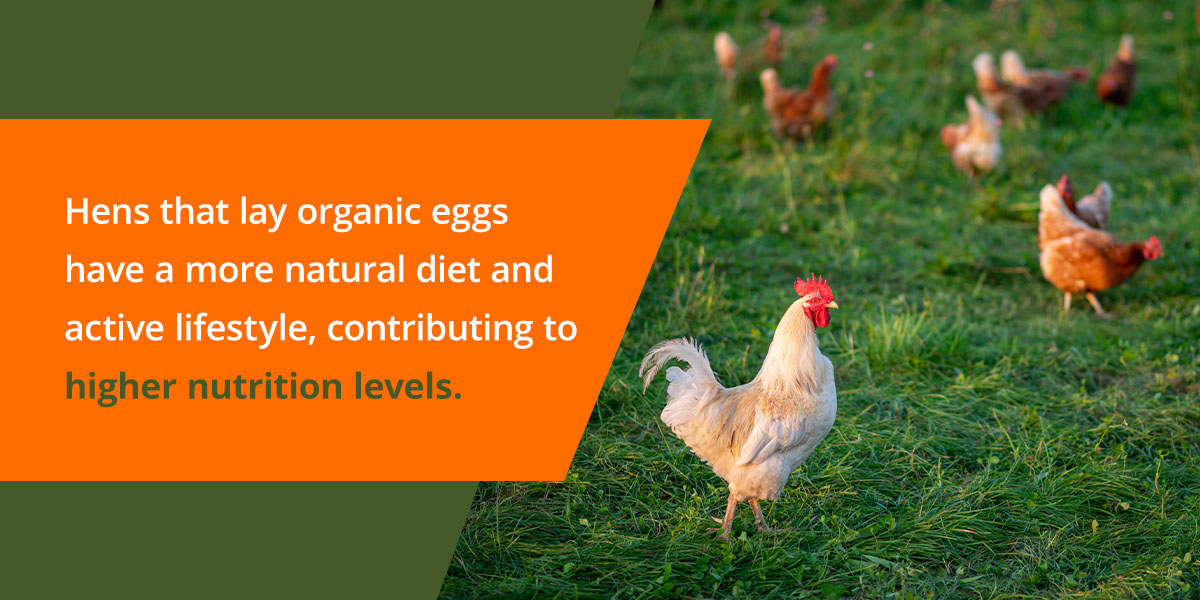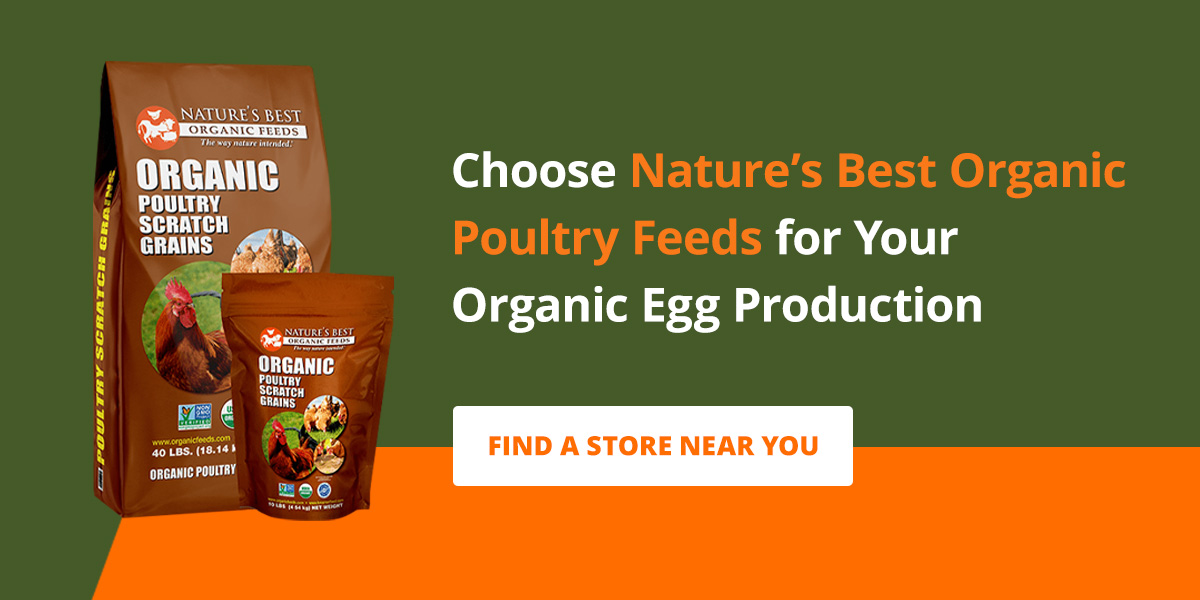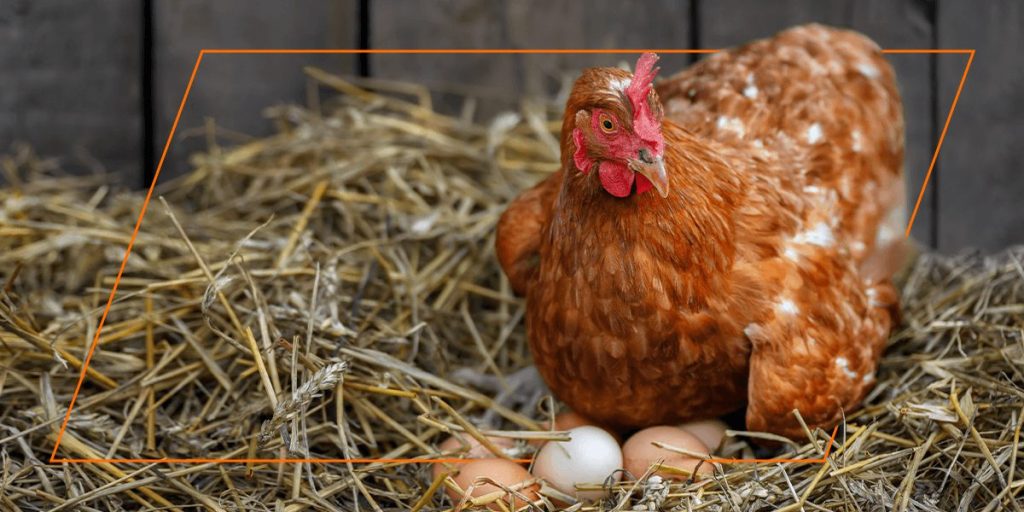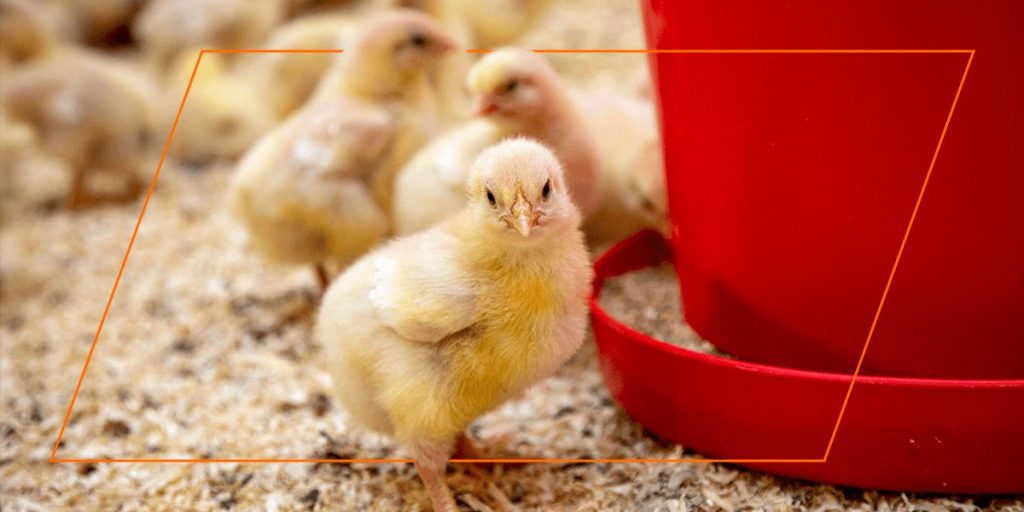Growing consumer awareness of organic food’s health and environmental advantages has caused a notable shift away from factory-farmed poultry and egg production. The demand for alternatives to conventional farming continues rising as more people become acquainted with the benefits of eating organic.
As a chicken farmer, you know the importance of using suitable breeding and dietary choices for egg production. However, you might be unaware of the criteria separating organic from commercial eggs.
Aside from egg-laying, poultry feed is one of the most significant factors when raising birds that lay organic eggs. It can determine whether your eggs fulfill the recommended standards to qualify as organic.
Understanding the requirements for producing organic eggs and knowing what makes an egg organic are some of the best ways to ensure you meet the criteria.
What Are Non-Organic Eggs?
Non-organic eggs come from large, industrial farms. Manufacturers often use traditional methods like keeping egg-laying chickens in a small cage or coop. Non-organic farmers give their birds conventional feed. These hens may also receive daily antibiotics and hormones. Non-organic egg-producing birds might only have access to the outdoors if they are free-range.
USDA Standards for Organic Eggs
The United States Department of Agriculture provides standards and classifications for organic egg production. When eggs have the USDA’s National Organic Program stamp, they have passed tests certifying them as organic.
These criteria include allowing hens to be free-range, meaning they do not live in battery cages. Instead, they roam in their habitat and have unrestricted access to the outdoors. Additionally, manufacturers feed hens 100% organic or vegetarian diets, free from synthetic fertilizers, pesticides, herbicides, and hormones.
What Makes Eggs Organic?
Many factors determine whether eggs are organic, including a hen’s living conditions, feed ingredients, molting, and dietary habits. Here’s how to identify organic eggs.
Living Conditions
Instead of living in a caged area, organic-producing chickens must roam free in their habitats. They live outdoors and eat grass and insects. These chickens also get more exercise, ensuring they stay healthy and lay high-quality eggs.
Vegetarian Feed
The type of feed hens eat is another way to identify organic eggs. Organic eggs come from hens who eat a vegetarian diet with zero additives, pesticides, synthetic fertilizers, and chemicals. Additionally, these hens do not get any genetically modified foods.
Molting
Organic-producing chickens must have natural molting habits. Conventional egg farmers might induce molting by limiting water and food. Often, this practice is a way of delaying egg production so hens can produce larger eggs. In contrast, chickens must lay eggs naturally to meet organic requirements.
No Antibiotics
The chickens who lay organic eggs do not receive antibiotics unless they are sick, whereas other chickens can get antibiotics daily. Additionally, organic farmers or manufacturers cannot use hormones and drugs.
Price
Unlike conventional and free-range eggs, producing organic eggs can be more costly and time-consuming, increasing the price tag.
Certification Labels
One of the best ways to recognize organic eggs is by their certifications. Organic eggs have a National Organic Program stamp from the USDA.
Organic Eggs vs. Regular Eggs — Are Organic Eggs Better?
Organic and regular eggs provide numerous vitamins and minerals for a healthy and balanced lifestyle. They can also have various grading standards and sizes.
For example, A-grade eggs can have thicker egg whites than B-grade eggs, while extra-large eggs contain higher protein content. Therefore, organic and regular eggs can have shared characteristics, and choosing between them often depends on preference.
The most significant difference between organic eggs and regular eggs is the production. Hens that lay organic eggs have a more natural diet and active lifestyle, contributing to higher nutrition levels.

Benefits of Organic Eggs
Discover the exceptional benefits of putting organic eggs on your table. Produced through sustainable farming practices and without harmful chemicals or antibiotics, organic eggs offer a range of advantages beyond their delicious taste, from better nutrition to supporting animal welfare and environmental sustainability. Here’s why you can feel good about buying organic eggs.
Healthy, Balanced Diet
Organic eggs have numerous vitamins that are essential for balanced diets. Eating more nutritious food can improve your overall health.
Reduced Inflammation
Organic eggs can have more omega-3 fatty acids. Increasing omega-3 fatty acids in your diet can reduce inflammation and contribute to healthy brain functioning.
Improved Heart Health
The higher omega-3 fatty acids from organic eggs can reduce cholesterol levels, leading to better heart health and lower cholesterol levels.
Healthy Hair, Eyes, and Skin
Organic eggs can have high vitamin A content, giving you healthy hair, eyes, and skin.
Increased Immune Response
An increase in vitamin A from organic eggs can support your immune system, reducing illness and improving recovery.
Reduced Chronic Disease
Organic eggs have antioxidants like vitamin E and beta carotene, alleviating chronic disease symptoms and contributing to healthy red blood cells.
Our Organic Chicken Feed
Nature’s Best offers a wide selection of organic chicken feed. Whether you raise your chickens for organic egg production or as pets, we produce our feed with the highest-quality ingredients to ensure a healthy and happy flock.
We develop our meals to meet different poultry life cycles. Each product contains varying protein, calcium, vitamin, and mineral qualities, helping you provide your poultry with suitable nutrients at each life stage.
Accurate vitamin balance also contributes to these flavorful and nutrient-dense products.
- Poultry Scratch Grains: Fully fortified with crunchy and organic corn, barley, and wheat, providing an enjoyable treat for your layers and broilers.
- Pellets: Specially formulated at egg-laying maturity, supplying birds with vital nutrients like protein, vitamins, and amino acids to stay healthy.
- Starter/Grower Crumbles: Formulated for egg-laying chicks with an easily digestible and fully fortified mixture to ensure a healthy start to life.
Choose Nature’s Best Organic Poultry Feeds for Your Organic Egg Production
Getting suitable feed for your poultry at every life stage is essential for healthy organic egg production. It can determine your birds’ well-being and produce quality and credibility.
With 75 years of industry experience, we understand the importance of nutrition feed for raising hens who lay organic eggs. That’s why we work with nutrition experts to formulate premium-quality feed, ensuring your birds get balanced nutrition at each life cycle.
You can have peace of mind that your poultry has balanced and nutritious feed free from growth hormones, antibiotics, pesticides, drugs, chemicals, antibiotics, and animal byproducts.
As an industry leader and family-owned and operated business, we maintain the highest standards for our poultry feed. We check regularly to ensure our feed meets USDA organic requirements and criteria. We strive to provide our customers with trusted, non-GMO Project-Verified feed to give your chickens a healthy life from chick to egg-laying maturity.
Find a store near you or contact us for more information.




